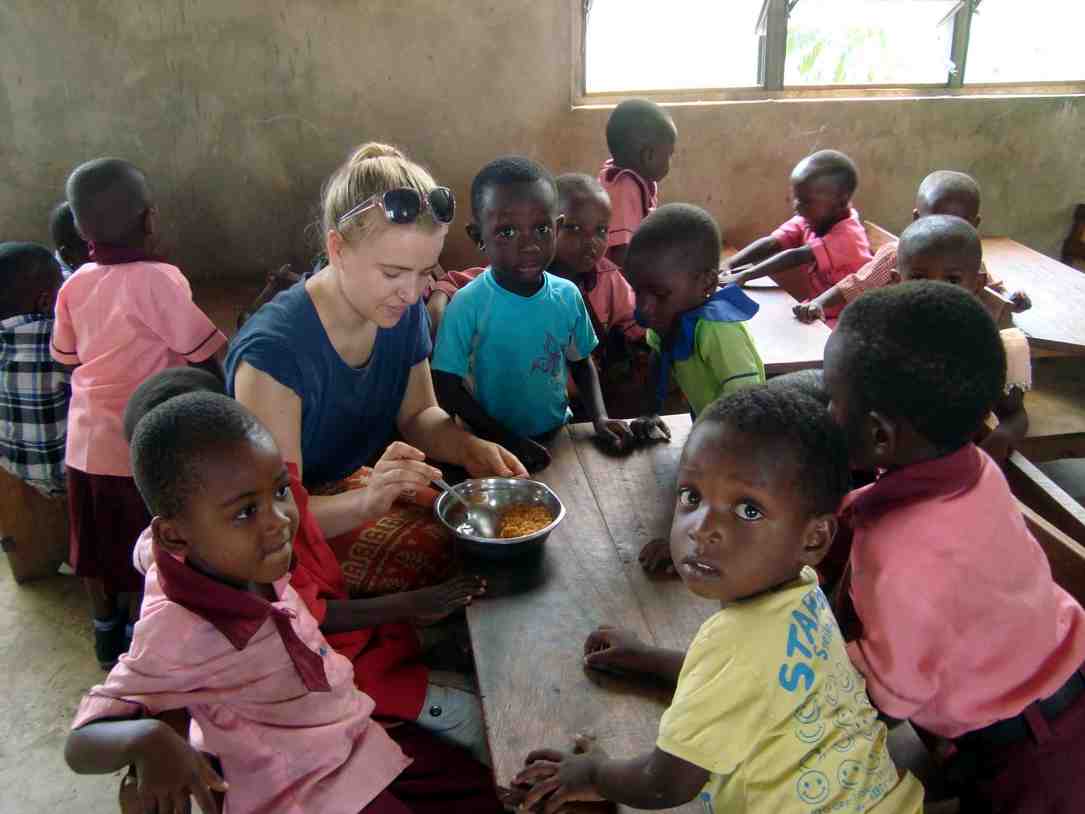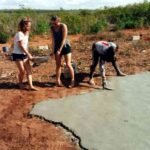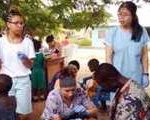- The program
- The orphanage
- Volunteer accommodation
- The feeding
- Entertainment and sight-seeing
- Volunteers’ safety
- Minimum qualification required
- Rough estimate of total cost involved
- Apply for this program
- Next steps — after you have been accepted
- Other relevant facts about the program
- Sign up for our Newsletter
- Submit a question

The program
The orphanage volunteer would be helping to:
- Maintain children in the orphanage by giving them the necessary care and attention as their mothers would have given them. This is achieved by feeding, bathing and ensuring general cleanliness of the children.
- Supervise day to day activities of the children in the orphanage i.e. sweeping, bathing, fetching of water
- Keep the girl and boys dormitories clean, plan extra-curricular activities, physical education, music and culture, indoor and outdoor games, morning and evening studies, organize excursions and so on.
- Organize children for extra classes after school.
- Organize them cultural activities such as singing, dancing, drumming etc.
- Teach the children any subject of your choice at the in-house school.
- Teach handicrafts, art, music, play with the children
- Help with the income-generating activities of the home: mushroom, vegetable, fruit, cereal and livestock farming.
- Any other activities related to children.
The orphanage home
The VIGS GHANA orphanage is located in a lovely little town called Bawjiasi; in the Central region of Ghana — within just 50 km of the capital city Accra. Back to top
You will be staying at the orphanage’s ‘Volunteer House’: All volunteers stay in a self contained house, which is about a 10 minute’s walk from the orphanage. The house has four bedrooms which can accommodate up to 12 volunteers maximum. Inside the volunteer House’s kitchen, Isaac, the greatest cook in Ghana prepares all kinds of sumptuous foods; and the volunteers eat in a common area. There is electricity but no running water. The water is brought by volunteers – from a water reservoir within the compound of the house. The rooms are equipped with beds, fans and mosquito nets. Back to top
The meals
8.00am – Breakfast;
12.00pm – Lunch;
6.30pm – Dinner.
Volunteers will be fed a variety of food including local dishes such as fufu, banku, kenkey and red-red, as well as ‘foreign’ meals such as rice and pasta. Vegetarians and vegans, as well as people with any other diet restrictions (e.g. gluten / lactose intolerance etc.) can easily be catered for. Volunteers have to budget for their own drinking water. Bottled (as well as filtered, bagged) water is available for purchase in many parts of the village. A 1.5 liter bottle costs about US$0.85 whilst a pack of bagged filtered water (popularly known as ‘pure water’) costs about US$0.90. One pack of bagged filtered water contains twenty-five 0.5 liter pieces of ‘pure water’ sachets or bags. An alternative to buying bottled or ‘pure water’ would be to treat the tap-water with water purification tablets. Water purification tablets are not readily available in Ghana so you would have to bring some along if you intend to treat your own drinking water. Back to top
Entertainment and sight-seeing
Weekends (Friday afternoon till Sunday evening) are free days. Volunteers at the children’s home usually would organize entertainment and sight-seeing trips as a group to interesting places near and far. Back to top
Volunteers’ safety
Your safety is of paramount importance to VIGS GHANA. As such we give you all the relevant safety tips, plus we place you only in places where good medical services are within easy reach. In addition, we’ll give you a smart phone – so you can call or text or email or Whatsapp the in-country supervisors whenever the need arises. Our in-country support staff are on call 24 hours a day, 7 days a week. Back to top
Minimum qualification required
Applicants for this program must be able to communicate in simple English since English is the official language of communication in Ghana. Back to top
Rough estimate of total cost involved
- Flight to and from Ghana: US$600-1250 (Round-trip)
- Ghana visa: US$80-170
- Vaccinations: US$150-250
- Travel Insurance: US$70-320
- Miscellaneous personal items: US$300-900
- Personal Spending money whilst in Ghana: US$200 upwards
- VIGS GHANA Program fee: starts from US$450
So, a rough estimate of the total cost for a two-week program duration would be about US$1,870 – 3,560. Check the equivalent in your currency. Back to top
Next steps — after you have been accepted and given your Placement information
After you have been admitted to participate in the program, you would now have to execute the following:
- Book a flight. See our Ghana flight information page. The earlier you book and confirm your flight, the better.
- Go through the suggested checklist of things to do and bring and start getting (or packing) them
- Send us your flight itinerary
- 60-30 days before your departure date, you must start processing for your Ghanaian visa. VIGS GHANA will provide you with the needed references in Ghana — which are needed to obtain a Ghanaian visa. Back to top
Other relevant facts about the program
- Minimum volunteering time: four (4) hours.
- Maximum duration: 6 months.
- Age range accepted: 18 – 75 years.
- We will send you a document on how to fund-raise for your trip – after you’ve confirmed your participation.
- We will meet you at the Airport in Accra (ACC) on your arrival day.
- The average work day is 3-8 hours for this program.
- Saturdays and Sundays are free days.
- You can contact VIGS GHANA local staff on cell phones all the time — 24 hours a day — seven days a week.
- We can give you a Testimonial on successful completion of your volunteer or internship work.
- You can pay the program fee through any of the following methods:
- PayPal or debit/credit card.
- Cash installments (or full payment) upon arrival into Ghana.



My friend and I want to spend one week at your orphanage come August. Are there places for us. We are open to extending our stay.
Hi Edwina!
Thanks for your offer. Yes, there are several places available on our orphanage program. Here’s the application form.
Subject: Partnership inquiry in Ethiopia
Greetings,
Fiker Behiwot Children and Youth Development Association in Ethiopia (FBCYDAE) has been established in September 2005 by AIDS, tobacco , alcohol orphan children and youth in Hawassa city, whose extended family in the community structure broken under the weight of the AIDS epidemic and poverty. The organization was founded by 7 orphaned children by AIDS and youth. Fiker Behiwot Children and Youth Development Association in Ethiopia (FBCYDA-E) has been registered and licensed by the Federal Democratic Republic of Ethiopia Charities and Societies Agency as an Ethiopian Resident Charity in the year 2005 G.C with registration number 2556 to operate at national level.
FBCYDA-E driven to change inequality and to contribute a just globe without poverty, destitution and human suffering. A globe where all children, young youth and women live in safety and have access to quality of education, healthcare, civil peace services, clean & potable water, sanitation and hygiene , food-nutrition, shelter, protection , technology inclusion , media and basic rights.
FBCYDA-E is accountable to General Assembly that convenes once year. Under the Assembly there is an Executive Board composed of 7 members of various professional mix, which meets once every quarter. FBCYDA-E has a secretariat vested with the responsibility of planning, executing and following up the day-to-day activities of the organization headed by the Executive Director.
Over the last 19 years, Fiker Behiwot Children and Youth Development Association in Ethiopia (FBCYDA-E) successfully implemented a number of integrated community development programs (ICDP) and became a forum for dialogue between peer democracy assistance organizations, policy decision-makers, and political thinkers in Ethiopia. Throughout the years the FBCYDA-E has grown and developed into the organization it is today. It is our practical and process-oriented approach, as well as the significance we put on local ownership that has made us into who we are today.
FBCYDA-E aspires to engage in collaborative development with leadership, social investments and strategic partnership that build social responsibility, vibrancy into the community and obliterate inequality. With this premium objective, FBCYDA-E has been cooperating with diverse development organizations, institutions and academia to transform the capacity of leaders, performers and development partners to be more efficient and effective, and create collaborative environments , strengthening the abilities of individuals, organizations and systems/ multiculturalism to perform functions sustainably, and to continue to improve and develop over time in the region, and reducing inequality and promoting human rights for minority and disadvantaged groups and striving to create a more just, peaceful and loving world.
We are working with Packard Foundation -Youth Challenge Initiative SRHR , GIZ, World BANK GFF, Save the Children , USAD Urban Agriculture , International Peace Youth Group, and Smart international Sweden
Social change doesn’t happen overnight, nor does it happen alone. We welcome the opportunity to work together with like-minded foundations and philanthropic sources, the corporate and community sectors, government agencies and individuals to pool resources and intertwine our efforts. We will work tirelessly to build our partnerships on trust, respect and results with both our grantees and our resource partners.
Thus, we would be happy to discuss with you and to give a brief description whenever needed at your convenience and arrange in person visit to our office as well as e- meetings.
Our program areas are :
· SRHR, HIV/AIDS treatment, PWDs care and support, GBV and mental health
· PWDs Family Economic Strengthening, and Humanitarian Assistance
· WASH, Menstrual WASH, Health, Education, social protection, child protection in emergencies
· Peace Building, Rights & Good Governance
· Financial Inclusion, digital inclusion, Job Creation and Employment
· Environmental Protection, Ecology and clean energy
· Culture , Art and Sport for development
· Better Migration Management
· Social infrastructure
We hope hopefully to partner with your well-regarded institution in projects, programs and research. We do expect your positive reply and possible cooperation in Ethiopia. The staff and volunteers of FBCYDA-E desire to serve you as you serve others. We are honored that you would FBCYDA-E as a potential partner in your work. We believe in the strength of a chain is in the power of each link. The organization is member of National and International networks, own media studio and skilled 1570 youth councils.
Thank you for your positive reply, and possible partnership in projects and programs in Ethiopia.
Should you have any inquiries, please do not hesitate to contact us.
Sincerely,
Mesay Tadese
Program Manager
FBCYDA-E
Cellphone: +251 993 429 152
where can I get support of volunteers to empower the orphans of our organisation in Jinja District of Uganda.
Thanks